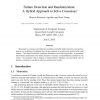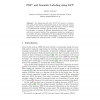1147 search results - page 59 / 230 » Termination in language-based systems |
LOPSTR
2004
Springer
14 years 2 months ago
2004
Springer
Offline partial evaluation techniques rely on an annotated version of the source program to control the specialisation process. These annotations guide the specialisation and have ...
IJCAI
2003
13 years 10 months ago
2003
Increasing dialogue efficiency in case-based reasoning (CBR) must be balanced against the risk of commitment to a sub-optimal solution. Focusing on incremental query elicitation i...
SIAMCOMP
1998
13 years 8 months ago
1998
We present a consensus algorithm that combines unreliable failure detection and randomization, two well-known techniques for solving consensus in asynchronous systems with crash f...
ESSLLI
2009
Springer
13 years 6 months ago
2009
Springer
The polynomial path order (POP for short) is a termination method that induces polynomial bounds on the innermost runtime complexity of term rewrite systems (TRSs for short). Seman...
JAPLL
2010
13 years 3 months ago
2010
We discuss recent work generalising the basic hybrid logic with the difference modality to any reasonable notion of transition. This applies equally to both subrelational transiti...



